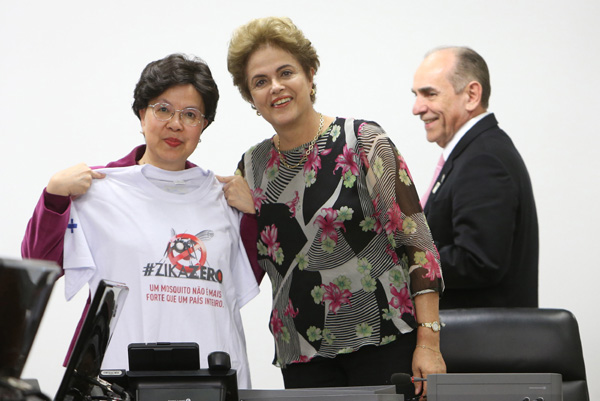BRASILIA - World Health Organization (WHO) Director General Margaret Chan said on Tuesday Brazil is doing a good job tackling the Zika virus and ensuring that the Olympic games it will host in August will be safe for athletes and visitors.
|
 |
|
World Health Organization (WHO) Director-General Margaret Chan (L) receives a T-shirt from Brazil's President Dilma Rousseff during their meeting at the Planalto Palace in Brasilia, Brazil, February 23, 2016. The T-shirt reads "A mosquito is not stronger than an entire country". [Photo/Agencies] |
Chan said Brazil's government is doing all it can to mobilize Brazilian society in fighting the "formidable" Aedes mosquito that transmits the virus that has spread rapidly through the Americas since last year.
"I want to reassure you that the government is working very closely with the international Olympic movement, with the local organizing committee, supported by the WHO, to make sure we have a very good work plan to target the mosquito, and to make sure that people who will come here either as visitors or athletes will get the maximum protection they need," Chan said.
"I am confident the government can do it," she told reporters after meeting with Brazilian President Dilma Rousseff.
The virus has been linked in Brazil to an alarming surge in the birth of babies with abnormally small heads, a condition known as microcephaly, and other neurological disorders.
Brazil's Health Ministry said on Tuesday that the number of confirmed and suspected cases of microcephaly has risen to 4,690 from 4,443 a week earlier. Of these, the number of confirmed cases climbed to 583 from 508 a week earlier.
Brazil considers most of the cases of microcephaly to be related to Zika, though the link between the virus and the birth defects has not been scientifically established. The WHO declared the Zika outbreak, which has spread to more than 30 countries, an international health emergency on Feb. 1.
Brazilian authorities are scrambling to contain the outbreak which threatens to keep visitors from attending the Olympic Games in Rio de Janeiro five months from now.
With no cure or vaccine for Zika, the only way to deal with the virus at present is to reduce the population of the Aedes mosquito that also carries the dengue and chicungunya viruses.
Chan said Brazil has been very transparent in sharing information on the virus with the rest of the world, and taking a leadership role in collaborating with other countries in the research and development of diagnostic tools and a vaccine.
She praised Rousseff's leadership in mobilizing the whole of Brazilian society, including the army, the private sector and religious leaders, in a campaign to eradicate the mosquito's breeding places in urban areas.
"The Zika virus is very tricky. We should expect to see more cases. We should expect this to be a long journey, but the government commitment led by President Rousseff is commendable," she said. "Base don what I have seen here, I can tell you: the mosquito is difficult, but it cannot beat Brazil," Chan said.